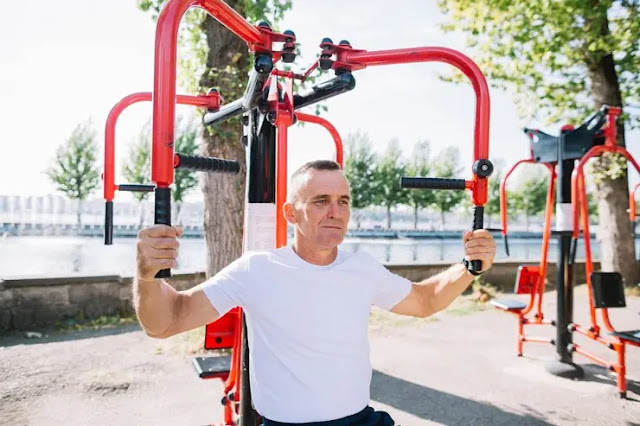Healthy Aging through Physical Fitness and Self-Reliance
Healthy aging is a topic that is gaining increasing attention as people approach their later years. Aging is a natural part of life, but it does not have to mean a decline in independence and vitality. By taking proactive steps to maintain physical, mental, and emotional well-being, it is possible to age in a way that is fulfilling, active, and enjoyable. This article will explore key strategies for healthy aging, including maintaining physical health, eating for health and longevity, promoting mental well-being, and building a strong support system.

1. Maintaining Physical Health
One of the biggest challenges of aging is maintaining physical health and mobility. Regular exercise is one of the most effective ways to address this challenge, as it can help improve balance and coordination, reduce the risk of falls, and boost heart health. There are a variety of exercise options available for aging adults, including low-impact activities such as walking, swimming, and yoga, as well as resistance training, such as weightlifting. The key is to find an activity that you enjoy and make it a regular part of your routine.
In addition to exercise, there are several other strategies that can be utilized to maintain physical health as we age. This includes staying hydrated by drinking plenty of water, eating a healthy, balanced diet that includes a variety of fruits, vegetables, whole grains, and lean proteins, maintaining a healthy weight, getting regular check-ups and screenings, and avoiding harmful habits like smoking and excessive alcohol consumption. By taking a proactive approach to physical health, aging adults can maintain their mobility, independence, and quality of life for years to come.
2. Eating for Health and Longevity
Nutrition plays an important role in healthy aging, as our nutritional needs change as we grow older. Eating a healthy, balanced diet that provides the vitamins, minerals, and nutrients your body needs is essential for overall well-being. This can be achieved by eating plenty of fruits and vegetables, choosing whole grains over refined carbohydrates, incorporating lean proteins into your diet, limiting unhealthy fats and added sugars, drinking plenty of water, eating smaller, more frequent meals throughout the day, and monitoring portion sizes to maintain a healthy weight.
3. Promoting Mental Well-Being
Mental health is just as important as physical health, especially as we age. Mental health issues like depression and anxiety can have a significant impact on quality of life, so it is important to take steps to maintain mental well-being. This includes staying socially connected with friends and loved ones, engaging in activities that bring joy and fulfillment, practicing relaxation techniques like deep breathing and meditation, seeking support from a mental health professional if needed, keeping mentally active, and staying physically active. Exercise has been shown to have a positive impact on mental health, so it is a great way to improve both physical and mental well-being.
4. Building a Support System
Having a strong support system is crucial for healthy aging, as social connections can help maintain a positive outlook and provide comfort and support when needed. This can include spending time with friends and loved ones, joining a social group or club, volunteering or giving back to your community, staying in touch with family members who live far away, and seeking support from a therapist or counselor if needed. Building a strong network of friends, family members, and support groups can help you navigate the challenges of aging and provide a source of comfort and fulfillment throughout your life.
Conclusion
Healthy aging is a lifelong journey that requires effort and commitment. By focusing on maintaining physical health, eating for health and longevity, promoting mental well-being, and building a strong support system, it is possible to age in a way that is fulfilling, active, and enjoyable. It is never too late to start taking steps towards healthy aging. Whether you are just starting to think about the future or are already in your later years, incorporating these strategies into your daily life can help you maintain independence, vitality, and a positive outlook.
It is also important to recognize that aging is a unique and personal experience, and there is no one-size-fits-all approach to healthy aging. Some people may find that they need to make more significant lifestyle changes to achieve their goals, while others may be able to make small tweaks to their existing routines. The key is to be proactive and persistent, and to focus on the strategies that work best for you.
In conclusion, healthy aging is achievable for everyone, but it takes time, effort, and commitment. By focusing on maintaining physical and mental well-being, eating for health and longevity, and building a strong support system, it is possible to age in a way that is fulfilling, active, and enjoyable. So, embrace your later years and make the most of this exciting time in your life!

Comments
Post a Comment